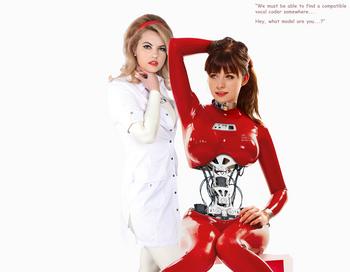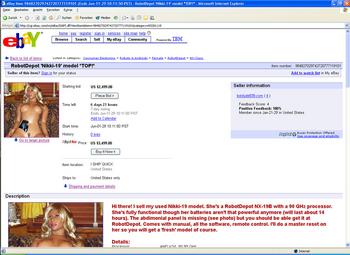Photo manipulation workshop: Difference between revisions
m (Text replacement - "Fembot Wiki" to "FembotWiki") |
mNo edit summary |
||
| Line 1: | Line 1: | ||
'''Photo manipulation''' involves altering existing images to a specific goal, and is a frequent practice in [[robot]] fetishism and [[fembot]] fetishism. | |||
[[File:Parts.jpg|thumb|right|350px|The addition of exposed machinery is a typical example of photo manipulation. ''By [[BA]]''.]] | [[File:Parts.jpg|thumb|right|350px|The addition of exposed machinery onto the photography is a typical example of photo manipulation. ''By [[BA]]''.]] | ||
[[File:Ebay.jpg|thumb|right|350px|Contextualizing a picture as a fembot for sale may constitute photo manipulation. ''By [[Bart]]''.]] | [[File:Ebay.jpg|thumb|right|350px|Contextualizing a picture as a fembot for sale may constitute photo manipulation. ''By [[Bart]]''.]] | ||
=Presentation= | |||
::"Photo manipulation involves transforming or altering a photograph using various methods and techniques to achieve desired results." | |||
::::— [[Wikipedia:Photo manipulation|Photo manipulation]] on Wikipedia | |||
Photo manipulation can be done through the use of analog tools, such as retouching with ink or paint, or more recently through the use of computer [[Wikipedia:Raster graphics editor|graphics editor software]]. The spelling "photomanipulation" can also be seen used, along with the more colloquial "manip". "Photoshop" can also be used as a noun and a verb, in reference to Adobe Inc.'s [[Wikipedia:Adobe Photoshop|Adobe Photoshop]] raster graphics editor software. | |||
In the context of robot fetishism and fembot fetishism, photo manipulation refers to the act of altering a picture, photographed, drawn or otherwise, into an expression of the fetish, namely robots with a high degree of resemblance to human beings. This may be done in various ways, for example through the adjunction of elements, such as [[Access panel|access panels]] or [[Faceoff|faceoff]], or by the removal of others, such as erasing limbs to suggest [[Disassembly|disassembly]] or [[Damage|damage]]. The adjunction of text, or the contextualization of a picture as showing a human-looking robot may constitute an instance of photo manipulation. | |||
Although it may exist as commissioned, professional work, photo manipulation as understood through robot fetishism and fembot fetishism is mostly an amateur and unsanctioned practice. Creators often require or request no monetary compensation and use scavenged images without express permission from the models, photographs or artists. Similarly to [[Wikipedia:Fan labor|fan labor]], these transformative works may infringe on the original authors' economic and moral rights, and may be litigious. | |||
=How-to= | |||
==Graphics editor== | ==Graphics editor== | ||
In the context of robot fetishism and fembot fetishism, photo manipulations are mostly created through the use of [[Wikipedia:Raster graphics editor|graphics editor software]], programs that allows creating and editing images on a computer. Some popular graphics editor are: | |||
*[Wikipedia:Adobe Photoshop|Adobe Photoshop], a commercial product by Adobe Inc., | |||
Some popular graphics editor are: | *[[Wikipedia:GIMP|GIMP]], free and open-source software maintained by volunteers, | ||
*[ | *[[Wikipedia:Paint.net|Paint.net]], freeware with plugin support created by Rick Brewster. | ||
*[ | |||
*[ | |||
While commercial software may offer more functionalities and easier accessibility, their gated nature tends to narrow their user base. On the other hand, open-source solutions or solutions supporting third-party additions might be free and have a more dynamic community, but may | While commercial software may offer more functionalities and easier accessibility, their gated nature tends to narrow their user base. On the other hand, open-source solutions or solutions supporting third-party additions might be free and have a more dynamic community, but may be more complicated to use. | ||
== | ==Community tutorials== | ||
*[[FaceoffFembot's damage tutorial for Paint.net]] | *[[FaceoffFembot's damage tutorial for Paint.net]] | ||
*[[Glast's GIMP Tutorial]] | *[[Glast's GIMP Tutorial]] | ||
| Line 32: | Line 35: | ||
</gallery> | </gallery> | ||
=Stock images= | |||
{{sort}} | {{sort}} | ||
Revision as of 18:18, 20 May 2020
Photo manipulation involves altering existing images to a specific goal, and is a frequent practice in robot fetishism and fembot fetishism.


Presentation
- "Photo manipulation involves transforming or altering a photograph using various methods and techniques to achieve desired results."
- — Photo manipulation on Wikipedia
- "Photo manipulation involves transforming or altering a photograph using various methods and techniques to achieve desired results."
Photo manipulation can be done through the use of analog tools, such as retouching with ink or paint, or more recently through the use of computer graphics editor software. The spelling "photomanipulation" can also be seen used, along with the more colloquial "manip". "Photoshop" can also be used as a noun and a verb, in reference to Adobe Inc.'s Adobe Photoshop raster graphics editor software.
In the context of robot fetishism and fembot fetishism, photo manipulation refers to the act of altering a picture, photographed, drawn or otherwise, into an expression of the fetish, namely robots with a high degree of resemblance to human beings. This may be done in various ways, for example through the adjunction of elements, such as access panels or faceoff, or by the removal of others, such as erasing limbs to suggest disassembly or damage. The adjunction of text, or the contextualization of a picture as showing a human-looking robot may constitute an instance of photo manipulation.
Although it may exist as commissioned, professional work, photo manipulation as understood through robot fetishism and fembot fetishism is mostly an amateur and unsanctioned practice. Creators often require or request no monetary compensation and use scavenged images without express permission from the models, photographs or artists. Similarly to fan labor, these transformative works may infringe on the original authors' economic and moral rights, and may be litigious.
How-to
Graphics editor
In the context of robot fetishism and fembot fetishism, photo manipulations are mostly created through the use of graphics editor software, programs that allows creating and editing images on a computer. Some popular graphics editor are:
- [Wikipedia:Adobe Photoshop|Adobe Photoshop], a commercial product by Adobe Inc.,
- GIMP, free and open-source software maintained by volunteers,
- Paint.net, freeware with plugin support created by Rick Brewster.
While commercial software may offer more functionalities and easier accessibility, their gated nature tends to narrow their user base. On the other hand, open-source solutions or solutions supporting third-party additions might be free and have a more dynamic community, but may be more complicated to use.
Community tutorials
- FaceoffFembot's damage tutorial for Paint.net
- Glast's GIMP Tutorial
- Robotman's GIMP tutorial on lighting and shadow effects
- Robotman’s Tutorial for Fembot Manips
-
evil boo's Photoshop Tutorial (Panels)
-
evil boo's Photoshop Tutorial (Removal)
-
evil boo's Photoshop Tutorial (Seams)
Stock images
Panels
Internal Shots
Backdrops
Faceoff
PSD files





































































































































